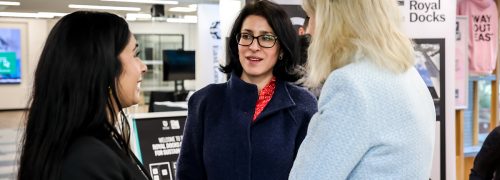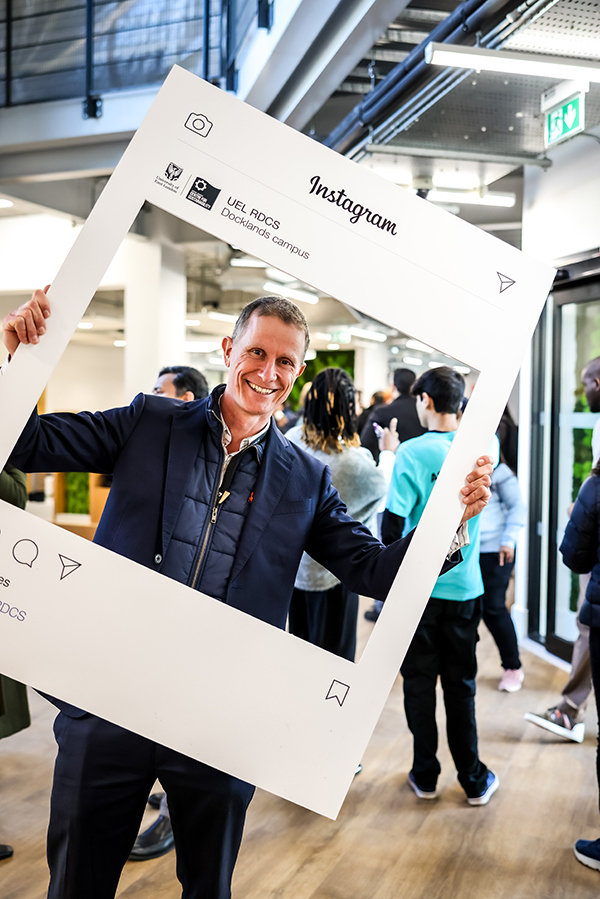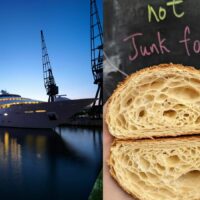
Business
Unlocking innovation and pioneering research in green technology
The Royal Docks Centre for Sustainability is a unique and exciting new space in the heart of the Royal Docks. Partially funded by the Royal Docks Enterprise Zone's Good Growth Fund, the RDCS is positioned to become a regional hub for innovation and creativity and forms a part of the University’s bid to become net carbon neutral by 2030.
We caught up with Robert De Jong, Director of the Royal Docks Centre for Sustainability. He explains what we can expect from this new facility and what’s in store for the year ahead.

Robert De Jong: Director of the Royal Docks Centre for Sustainability at the launch party in December 2023.
Congratulations on the very successful launch of the Royal Docks Centre for Sustainability in December. For the benefit of anyone who may not be familiar with this new centre, can you provide a brief overview of its core purpose, aims and ambitions?
The centre is a collaborative hub for schools, research centres, communities and industries to address sustainability challenges and foster innovation. Our focus is on developing skills aligned with future needs, ensuring graduates are well-prepared for a rapidly changing industry landscape. The centre aims to accelerate climate innovation, serve as an educational platform and position itself as a leader in climate transition and clean tech for East London and beyond. Inclusion and diversity are key priorities and core to encouraging collaboration across the campus and wider community.
This is an exciting new space for the Royal Docks. Can you describe the centre and what we can expect from visiting?
The RDCS sits within a refurbished building at UEL, formerly a business centre. Where there used to be pockets of space with organisations operating in silos, there are now open and collaborative spaces which naturally connect businesses, research centres and communities. The three floors house new facilities such as a hackathon space, new research labs, maker space, workshop areas, co-working, event and meeting facilities. The ethos and layout guides participants from idea generation on the top floor to development, community engagement and industry involvement on the ground floor.
We’re open Monday to Friday and our open-door policy allows anybody to drop-in during normal business hours. People can work from our public meeting areas and experience the centre as well as the university. We’re already hosting a number of small business meetings and events.
In his keynote speech at the launch event, the Mayor of London, Sadiq Khan, emphasised how the opening of the RDCS marks an important milestone, not just for UEL and Newham but for the whole capital. He said: ‘I believe this institution is best seen as symbolising two of the most important changes happening in London right now – our shift eastwards and our shift to Net Zero’.
Can you elaborate on how the RDCS embodies this direction of travel and what sets it apart from other institutions?
The centre is uniquely and strategically positioned in the Royal Docks, London’s only Enterprise Zone and amid East London's ongoing regeneration. There's no other area in London of this scale in terms of regeneration opportunity and potential.
The RDCS is also initiating a sustainability shift. We’re aiming for a significant leap forward. Our ambition is not only to be a net-zero exemplar but also a catalyst for change. Unlike conventional approaches, which focus on retrospective data, our centre strives to be forward-thinking. We’re seeking incremental steps toward a sustainable future, emphasizing system change across the city and broader society, with a crucial social element – so how do we bring people along with us. We’re guided by Newham’s Just Transition plan, which champions holistic, equitable and collaborative approaches to climate action. We’re challenging ourselves around issues that we know are quite difficult or which can’t be addressed by one sector alone. We are exploring new forms of learning, skills development, governance, through to new ways of working.
Supporting the growth of clean, green technology, promoting community wealth building and inclusive innovation are key priorities for both the Royal Docks programme and Newham Council.
Can you provide examples of how the RDCS will contribute to these priorities and benefit local communities?
We are playing a crucial role in developing skills for future communities and industries. The centre aims to lay the foundation for sustainable communities, contributing to the vast regeneration potential of the area and supporting Newham’s knowledge and capacity for a climate-resilient future.
Our open-door policy means communities can come in and use the space. We offer areas for business start-ups and facilitate collaboration with the university’s research programmes. We’re establishing partnerships with local stakeholders, across sectors from Newham Chamber of Commerce and Stratford BID to community groups. For example, we initiated a sustainable leaders programme, which aims to provide a learning and innovation platform, creating a space for communities to learn about sustainability, how to implement social change and explore issues such as community wealth inequalities.
Core principles of the RDCS are co-creation and collaboration. Can you provide examples of any existing partnerships that are already underway – partnerships that are bridging the gaps between academia, industry and communities and exploring sustainable and environmentally friendly solutions to organisations’ unique challenges and aspirations?
There are several groups and centres within the RDCS, notably the Sustainable Research Institute which boast over 20 years’ experience. They've partnered with Tate & Lyle to develop Sugarcrete, which is being used to create blocks and housing materials from the byproduct of sugarcane. The institute features a makerspace for co-creation and prototyping, incorporating 3D modelling, robotics and advanced machinery.
Additionally, a collaboration with Siemens, Living Lab, involves an IoT platform capturing comprehensive building data, from energy consumption to air quality and temperature. This platform serves as a learning and research hub, facilitating innovation and driving net-zero initiatives across campus buildings.
Excitingly, the centre also houses the Rix Centre which leads inclusive research in reducing inequalities in care quality and improving service provisions and access to opportunities for people with learning disabilities, as well as the Sustainable Enterprise Centre—an acceleration and incubation space for small startups born out of UEL and the community. They will have access to co-working space, accelerator programme activities and be part of wider RDCS participation in research and industry engagement.
What does 2024 hold in store for the RDCS? Can you discuss any key collaborations and initiatives planned for the year ahead?
We’ll be working with local stakeholders to create a Blue Green Corridor project that aims to create a healthier east London by addressing air quality, biodiversity, ‘green’ employment opportunities and infrastructure more broadly. We’re taking a visionary approach saying ‘Ok what does a healthy east London look like? What are the things we need to change or adapt for everyone to feel inspired and experience a good quality of life’.
In 2024, the centre will launch programmes focusing on sustainable creatives, the future of business and cities and innovation pathways in digital skills and clean tech. While flagship programs are in progress, we're open to collaborations with innovation hubs, wider industries and global players.
A big focus for UEL this year is our Year of Science, which will culminate in the British Science Festival taking place at our Docklands campus in September. Throughout the year, you can expect to see a series of exciting events and workshops exploring how technology and AI are impacting our lives, careers and communities and importantly, how we can use science to create a greener, fairer world.
Upcoming events at UEL:
- National Apprenticeship Week, 5th – 9th February
- Skills for a Sustainable Future – Sustainable Business and Industry Round Table, 14th March
- Sustainability Festival, 20th March
To find out more about the Royal Docks Centre for Sustainability, email: rdcs@uel.ac.uk


